- Home
- Sharon M. Draper
Copper Sun Page 2
Copper Sun Read online
Page 2
The men with skin like the milk of goats and their Ashanti companions drank the palm wine from hand-carved gourds that had been decorated with ceremonial tribal designs. The newcomers then offered gifts to the chief: small ropes of sparkling beads unlike anything Amari had ever seen, casks of wine, and lengths of fine cloth—so shiny and smooth that Amari marveled. She knew no human could have woven it.
No real explanations for their presence had been given yet, but with the exchange of gifts, the feeling of unease began to lessen and everyone knew that the dancing and drumming would soon begin. Ceremony was important. Business matters always followed proper celebration. It was not yet the time for questions. First came the stories, Amari reminded herself, starting to feel excited.
As chief storyteller, Amari’s father was highly respected. Komla knew every story, every proverb, every bit of tribal history ever told or sung or drummed by her people. He spoke at each birth, funeral, and wedding, as well as at unexpected special occasions like this. The villagers crowded around him in anticipation, although even the youngest child knew by heart every story he would tell. The strangers sat politely and waited.
“Let me tell you of the wickedness of Chief Agokoli,” her father began. “He was a wicked, wicked man.”
“Wicked,” the people responded with enthusiasm.
“He would give the Ewe people impossible jobs—like weaving baskets out of sand.”
“Impossible!” the villagers responded almost in unison.
“The Ewe people finally found a means to escape from the wicked ruler,” Komla recounted. “The people crept out through a hole in the wall and fooled the soldiers of Chief Agokoli. And how did they do that?” he asked the crowd, who, of course, knew the question was coming, as well as the answer.
“They walked backward in the dirt!” the people responded enthusiastically.
“And so they did,” Komla said, ending his tale with a tapping on his drum. “They walked backward on the dirt path so their footprints looked like the prints of someone arriving into the village, not departing!” He looked over at Amari as he finished the tale with a wink he saved for her alone.
Everyone in the small community, including Amari, laughed and clapped their hands at the familiar story. Amari loved her father’s stories, and the sound of his deep, gravelly voice had always made her feel safe, whether he was whispering silly noises in her ear, speaking formally in a meeting of the elders, or chatting with affection with her mother.
To the family’s great amusement, Komla would sometimes sing to them in their small hut after the evening meal. “You sound like a monkey in pain,” Amari’s mother would tell her husband fondly. But when he was telling stories, his voice was magical; Amari could listen to him all night.
The feeling of tension faded. The drumming would come next, and, after the storytelling, this was Amari’s favorite part of her village’s celebrations.
Amari looked around for Besa. He was the assistant to the village master arts man, the one responsible for the creation of all the dances and drum rhythms. She knew Besa would be anxious to show off his skill on the drum he had carved and painted himself. Amari was proud of how devoted Besa was to learning the rhythms. He’d told her once, “You know, Amari, the drums are not just noise—they are language; they are the pattern of the rhythm of our lives.”
He had no need to look at his hands to produce the drum sounds that lived within him. She loved to watch Besa stare into space, smiling as he drummed, lost in the rhythms he created.
As soon as the master drummers started playing, everyone in her village felt the call. The younger boys, whose fingers itched to show their skills, grabbed their own small drums and joined the beat. Villagers began to get up and move to the rhythms. Besa played with the confidence and skill he always did. Amari’s eyes were on only him; her heart beat faster as Besa’s fingers caressed the sounds out of his skin-covered drum.
Drumbeats echoed in the approaching darkness. The fire in the center of the assembly area glowed on the faces of the dancers, mostly younger children and women at first, but soon nearly everyone in the village joined in, even the old ones whose toothless grins spoke their happiness. All spoke to the spirits with their joyous movements. Their bodies swayed, their hands clapped, their feet stomped in a glorious frenzy, all to the rhythm of the drums.
Ba ba la ba do ga we do
the words are sounds are words from deep within
from a place that was lost now found
sobo hee we do so ma da ma da so so
sound is self is you is we sound is past is now is so
sobo hee we do so ma da ma da so so
from remembered past to forgotten tomorrow
drum talk throbs breathes life speaks song sings words
Ba ba la ba do ga we do
warriors pulse maidens sway elders children rejoice
thrum to the heartbeat thrum to the heartbeat
ba ba la ba ba ba la ba ga we do
Kwasi, as round and brown as a Kola nut, danced with the rest of the children, gleefully spinning in the dust. Amari watched him and remembered how he once had captured a small bird and copied its movements, flapping his arms like wings, telling her, with much laughter, that he intended to learn how to fly. And as Kwasi stomped and glided through the dust that evening, it seemed to Amari that he really was flying.
He ran over to Amari then, breathing hard with excitement. “Come,” he said, grasping her arm and trying to pull her into the dancing. “Why do you hide in the shadows? Come dance for the strangers!”
She pushed Kwasi away gently, reminding him she was no longer a child. She was to be married soon, and she preferred peeking at Besa, who stood behind his waist-high drum on the other side of the fire, watching her as well.
The drumbeats rippled in the darkness, the dancers swayed and stomped on the hard-packed earth, and Amari’s people clapped and laughed as the firelight glimmered in the night.
The first explosion came from the end of one of the unusual weapon sticks the strangers carried. Louder than any beat of even the largest drum, it was followed by a cry of horror. The chief had fallen off his seat, a huge red bleeding hole in the center of his chest. More explosions followed in rapid succession, then everyone was screaming. Confusion and dust swirled throughout the village. Amari watched, aghast, as a mother with her baby wrapped on her back tried to flee, but both mother and child were clubbed down into the dirt by one of the Ashanti warriors. An Ashanti! How could this be? Villagers ran blindly into the fire, trying to escape and screaming for mercy, only to be felled by the terrible fire weapons of the strangely pale men.
Amari knew she should run; she knew she should try to escape into the forest, but her feet would not move. She could only stare in horror. She gasped as she watched an Ashanti grab her mother and try to put thick iron cuffs on her mother’s wrists. She turned her head and followed, in slow motion it seemed, her father’s bellows of rage as he leaped toward her mother to rescue her. But before he even reached her, one of the milk-faced men thrust a knife into his stomach, and Komla fell silently to the earth. Amari’s mother screamed in anguish and bit her captor’s hand. Enraged, he hurled her to the ground. Amari watched, unable to breathe or move, as her mother’s head smashed upon a rock. Amari wanted to scream, Mother, get up, oh, please, get up, but she was unable to say a word. Her mother did not move. Amari needed her parents to come get her, to tell her not to be afraid, to run with her into the underbrush for safety. But they just lay there, their blood beginning to stain the dust. Amari doubled over in agony. Her parents were dead.
She looked frantically for Besa and Kwasi, but all was smoke and screams and death. Finally, she saw Kwasi running toward her, screaming, “Run, Amari, run!” Her feet loosened then as he reached her. She grabbed his hand, and they ran wildly out of the village into what they hoped was the safety of the darkness. Sharp branches cut Amari’s face as she plunged through a thick tangle of trees. The smell of sharp, acrid
smoke, not of gentle hearth fires, but of the flames of destruction, followed them. Birds and monkeys above them cried out in alarm, but their noise could not cover the screams of the slaughter of her people.
Suddenly, Amari heard fast-moving, thudding footsteps behind them and the whirr of a spear. Kwasi held her hand tighter and they ran even faster, Amari trying in vain to be as invisible and swift as the wind. Fly, my baby brother, she thought desperately. Fly away! One moment they were leaping over a fallen log, and the next moment she heard Kwasi moan softly, then his hand slipped slowly from hers. He slumped to the ground, a look of soft surprise on his small face. A spear had sliced though his whole little body. Amari sank down beside him and held him to her. He died in her arms.
She lay there in the darkness, cuddling his small, lifeless body, unable to weep, unable to run any longer. She hardly cared when she was grabbed by one of the strangers. Her arms were wrenched behind her, and iron shackles with heavy, rusty chains between them were snapped onto her wrists, holding them there. Amari was marched back to where the burning village had once stood so happily, grabbed by her hair, and shoved into a pile of other survivors from the village.
No one spoke. No one wept. They were defeated.
3. SORROW AND SHACKLES
WHEN THE SUN ROSE THE NEXT MORNING, Amari looked with horror at what was once her tribe’s village. All of the homes had been burned, their roofs of thatch and walls of reeds consumed by the fire. The charred and bloodied bodies of relatives remained where they had fallen, with no one to perform proper rites for burials, no one to say the prayers for the dead. Amari knew that the pale strangers probably did not know their customs, could not understand the seriousness of the proper burial procedures, but the Ashanti were people of her own land, supposedly brothers in spirit with Amari’s people. How could they do this and face their own future? she wondered in horrible confusion. It was just one of many questions for which she had no answer. Where did these strangers come from? Why do they want to hurt us? How can I continue to live without my family? It took all of her strength not to look at the bodies of her parents. Amari’s heart hurt in a way she could never have imagined.
Twenty-four of the villagers had survived the slaughter. She glanced around the group and realized that most of them were around her age—young and fairly healthy. None of the elders had been spared, none of the children. Esi and her new husband, Makafui, huddled together, even though they had been shackled apart. Amari knew that Esi was carrying her first child, for she had announced it with joy just two days before. Amari also had seen that the parents of both Makafui and Esi were included among the dead. Kwadzo, a young man known in the village as a fierce hunter, pulled angrily at his shackles, his wrists already bleeding as he fought their restraint. A huge gash on his head had stopped bleeding but was open and untreated. He needed the medicine woman to wrap it in healing leaves, but no one seemed concerned about his injury. All of the young male captives had sustained some type of injury.
Finally, at the far end of the huddled circle of captives, Amari spotted Besa. He looked at her with glazed, saddened eyes. In the distance, where such a short time ago he had played with such power and joy, she spotted his beloved drum, crushed and in splinters in the dirt. Amari wished she could smile at Besa to give him hope, but she had no hope to offer. He looked away.
Suddenly, one of the pale-faced men with the death sticks came over to them, shouting in a language she did not understand. He made it clear, however, that they were to get up from the ground immediately. Most of their captors, both black and white, carried both whips and fire sticks. Amari looked around in fear and tried to ask what was happening, but all she received in response was a vicious slice of a whip across her arms and neck. She cried out as she arched her back in pain, but she hurried to her feet and asked no more questions. She glanced at Besa. His face was distorted with anger.
One of the pale men then brought out objects that she would not have used even on animals. They were similar to the iron bands on her wrists, except these fit around their necks! A length of iron chain connected each neck band, so each was linked to the next in a single file of chains and captivity.
As the iron band was placed around her neck, Amari felt as if she would choke. It was cold and heavy and cut into her shoulders. The chain was then pulled sharply as the next person in line was shackled behind her. Amari could not turn and see who it was. She could see only the back of the person in front of her. It was Tirza, the young woman who just hours before had been chasing that runaway goat. Tirza could not stop shaking with fright.
The pale-faced men fastened similar irons on their ankles, with a short length of chain between them, and a longer chain linking each person in the coffle together, thus making it impossible for them to run away or even walk very fast. Fastened together in groups of six, the wrists, ankles, and necks of each captive were painfully connected to the person on either side. Once the villagers were all linked, a white face pulled the first person with a rope, and those linked to him lurched forward as well. Amari stumbled, but the neck iron stopped her fall. She choked and tried to grab her throat, but her arms were shackled as well. Gasping, she fell into step with the others, who, with heads bowed, shuffled together toward they knew not what.
Besa, Amari noticed, was in the front of his coffle of captives. He would not look at her, glancing away whenever she tried to catch his eye. She realized he must be feeling terrible shame—shame that he could not rescue himself, or Amari, or change any of what was happening to them.
If one in their group stumbled, all of them stumbled or sometimes even fell, choking as the chains pulled them down together. Beaten with whips if they fell, beaten if they failed to keep the pace, they headed slowly away from everything they had once known. The bright red pain across Amari’s back and on her wrists and ankles made her whole body tremble. She felt as if she might pass out. The heat of the sun showed no mercy, and she couldn’t even wipe away the sweat that burned her eyes as it ran down her face.
Her tongue felt thick—she was so thirsty, and she couldn’t remember the last time she had eaten. As she walked, she tried but couldn’t comprehend the incredible cruelty of the men who had done this. Nothing made any sense. Her stomach knotted up every time she thought of her last glimpse of her mother and father—dead, unburied, and covered with flies. And little Kwasi—he was just a small boy who had never even hurt a grasshopper. How could he be dead? Amari felt dizzy, but she dared not stop or stumble.
The first path they traveled was the long road that led from their village to the big river several miles away. It seemed as if even the trees bowed their heads as they passed. The birds, normally full of chatter, were silent as the group marched past them for the last time.
Day after day the captives walked, saying very little to one another or to their captors. One afternoon Amari heard Kwadzo try to speak to one of the Ashanti who guarded them.
“Why do you do this, my brother?” he whispered when out of earshot of the white soldiers.
“Our tribes have been at war before,” the Ashanti responded, a defensiveness in his guarded tone. “This time, however, I shall be greatly rewarded.” He strode ahead then and said no more. Amari wondered what he meant.
The wound on Kwadzo’s head grew swollen and purple, and Amari could tell he was in pain, but he continued on, as they all did, one foot after the other, mile after mile. His face was one of anger and hatred. Besa’s face, when she got a chance to glimpse it, had become a mask.
The captives were never unshackled. Each set of six ate together, slept together, and had to urinate and defecate together. They were given just a little food each morning and very little water. Each group was forced into a rhythm, keeping a pace that was difficult for the slowest and weakest of them as they marched. In Amari’s group it was Tirza who seemed to have given up. She walked slowly and stumbled often. Her back was soon a patchwork of welts from being whipped when she could not keep up with the rest. One n
ight she whispered, “I cannot live like this, Amari. My parents, my sisters—all whom I love—are dead. I would rather die than be enslaved like this.”
“Tirza, stop talking like that!” Amari whispered back. “We must live!”
“Why?” she asked dully.
“Because as long as we have life, we have hope!” Amari said fervently.
“Hope of what?”
“Escape, perhaps.”
“You are a dreamer, Amari,” Tirza told her quietly. “I have no dreams left.”
And the next morning Tirza was dead. She had simply ceased breathing during the night. The leader of their captors looked at her lifeless body and cursed. He unshackled her, tossed her body to the side of the road, and spat upon it. The rest of them were told to get up and move on. Amari was surprised and saddened to realize that the travel in their chained coffle, now five instead of six, was lighter and easier without Tirza. Her heart, however, seemed to beat more slowly and heavily. None of them wept for Tirza or even looked her way as they passed.
4. DEATH MARCH TO CAPE COAST
AMARI LOST COUNT OF THE DAYS THEY WALKED. Her neck, bruised and scarred from the iron brace around it, could barely hold her head up any longer. Her wrists and ankles were raw where the skin had been worn away, and insects swarmed around the oozing wounds. Her bare feet left bloody footprints upon the path—sliced by every stone and sharp stick she stumbled over. At first these difficulties bothered her. But gradually, she simply felt numb.
Kwadzo died one morning, probably from his untreated wound, Amari thought, or maybe from his untreated sorrow, but she could not mourn his loss. She actually envied him. Seven others died during their long journey. Esi, the young wife of Makafui, first lost her baby, then her own life. Amari was sure she bled to death. Unable to control his grief, Makafui grabbed one of the leaders of the march and tried to strangle him with his wrist chains. How he managed to get his hands in front of him, Amari did not know, but before Makafui had a chance to succeed in killing the man, one of the others calmly picked up his fire stick and shot him. He was left on the side of the road for the hyenas, as the others had been.

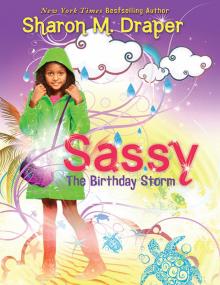 The Birthday Storm
The Birthday Storm November Blues
November Blues The Backyard Animal Show
The Backyard Animal Show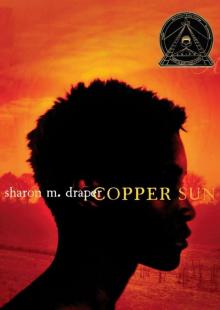 Copper Sun
Copper Sun Romiette and Julio
Romiette and Julio The Sassy Collection
The Sassy Collection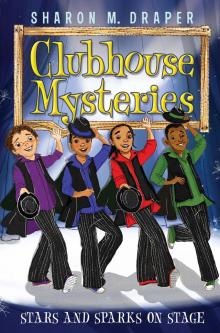 Stars and Sparks on Stage
Stars and Sparks on Stage The Battle of Jericho
The Battle of Jericho Tears of a Tiger
Tears of a Tiger The Dazzle Disaster Dinner Party
The Dazzle Disaster Dinner Party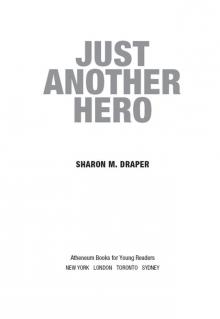 Just Another Hero
Just Another Hero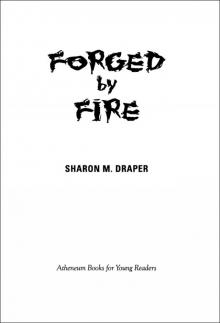 Forged by Fire
Forged by Fire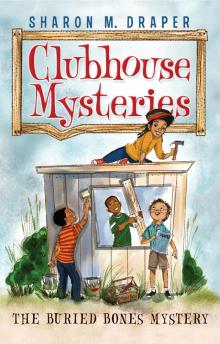 The Buried Bones Mystery
The Buried Bones Mystery Out of My Mind
Out of My Mind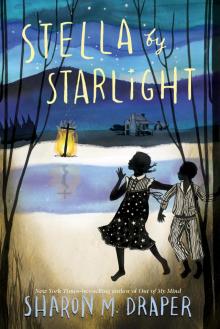 Stella by Starlight
Stella by Starlight Panic
Panic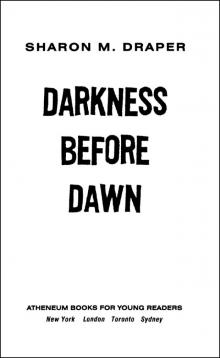 Darkness Before Dawn
Darkness Before Dawn The Space Mission Adventure
The Space Mission Adventure Double Dutch
Double Dutch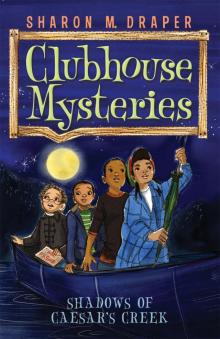 Shadows of Caesar's Creek
Shadows of Caesar's Creek